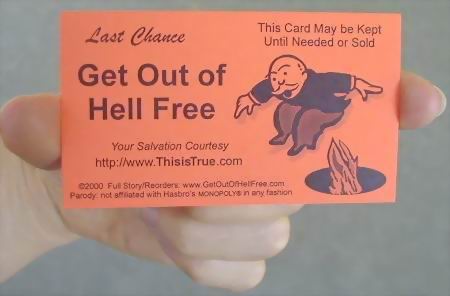In 2000 the Manhattan law firm of what appear to be over aggressive IP attorneys representing Hasbro wrote Randy Cassingham a “cease and desist” letter for Get out of hell card he was selling. Eventually they had Randy add the source disclaimer to the above card and the matter appeared over. Fast forward 9 years:
The same law firm appears to have amnesia:
We recently became aware that you are offering for sale “Last Chance – Get Out of Hell Free” cards and stickers on your website at www.goofh.com that depict the famous MR. MONOPOLY® character and are obviously derived from the MONOPOLY® “Chance” card.
The MR. MONOPOLY® character is the copyrighted property of Hasbro, and also has source-identifying significance as a trademark. Your unauthorized copying of the MR. MONOPOLY® character constitutes copyright infringement … and also violates the federal trademark laws … by creating a likelihood of confusion with respect to Hasbro’s authorization or sponsorship of or association with your activities. Your unauthorized use of the MR. MONOPOLY® character is also likely to dilute its distinctive quality and hamper its ability to function as a source-identifying [trademark]….We therefore demand that you immediately cease and desist from any further use of the MR. MONOPOLY® character, remove the cards and stickers from your website, and provide us with a written assurance that in the future you will refrain from any further unauthorized use of the elements and characters of the MONOPOLY® property trading game.
To assist Hasbro in determining the harm that has been, [sic] we demand that you furnish us with information concerning the length of time that you have sold the infringing cards and stickers, the number of units that have been sold, and the total revenue you have received to date. We will then be in a position to discuss monetary compensation for your unauthorized use.
Here is a little on the history of Monopoly from Wikipedia:
The history of Monopoly can be traced back to 1904, when a Quaker woman named Elizabeth (Lizzie) J. Magie Phillips created a game through which she hoped to be able to explain the single tax theory of Henry George (it was supposed to illustrate the negative aspects of concentrating land in private monopolies). Her game, The Landlord’s Game, was commercially published a few years later. Other interested game players redeveloped the game and some made their own sets. Lizzie herself patented a revised edition of the game in 1904, and similar games were published commercially. By the early 1930s, a board game named Monopoly was created much like the version of Monopoly sold by Parker Brothers and its parent companies throughout the rest of the 20th century and into the 21st. The Parker Brothers’ version was created by Charles Darrow. Several people, mostly in the U.S. Midwest and near the U.S. East Coast, contributed to the game’s design and evolution. Read the full article
The strongest defense to an infringement claim here is a parody defense, which is part of fair use, followed by an estoppel defense. Estoppel basically stops a party form claiming or denying an argument on the grounds that is is unfair. Given the previous stance by Hasbro that the disclaimer was enough this new demand is clearly unfair.
Does Hasbro and their lawyers have nothing better to do with there time…


